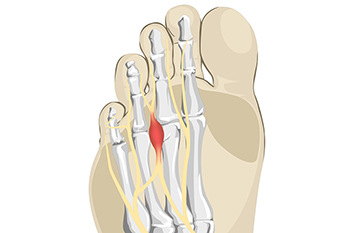Call Us Today! (203) 975-9600
SAME DAY APPOINTMENTS AVAILABLE
Who Is Susceptible to Morton’s Neuroma?
Tuesday, 27 September 2022 00:00
Morton’s neuroma can be a painful foot condition that results from inflammation of one of the nerves, which is typically found between the third and fourth toes. People who frequently wear high heels may be at risk of developing this ailment due to inadequate room for the toes to move freely. Additionally, people who participate in high-impact sporting activities, like running and basketball, may be prone to Morton’s neuroma. The common symptoms associated with this condition consist of the sensation of having a pebble in the shoe, as well as a numbing or tingling feeling that spreads to the toes. Relief may come from wearing shoes that fit correctly, and it may help to wear custom-made orthotics. If you are suffering from Morton’s neuroma, please consult with a podiatrist who can offer you various treatment techniques.
Morton’s neuroma is a very uncomfortable condition to live with. If you think you have Morton’s neuroma, contact one of our podiatrists of Preferred Footcare, LLC. Our doctors will attend to all of your foot care needs and answer any of your related questions.
Morton’s Neuroma
Morton's neuroma is a painful foot condition that commonly affects the areas between the second and third or third and fourth toe, although other areas of the foot are also susceptible. Morton’s neuroma is caused by an inflamed nerve in the foot that is being squeezed and aggravated by surrounding bones.
What Increases the Chances of Having Morton’s Neuroma?
- Ill-fitting high heels or shoes that add pressure to the toe or foot
- Jogging, running or any sport that involves constant impact to the foot
- Flat feet, bunions, and any other foot deformities
Morton’s neuroma is a very treatable condition. Orthotics and shoe inserts can often be used to alleviate the pain on the forefront of the feet. In more severe cases, corticosteroids can also be prescribed. In order to figure out the best treatment for your neuroma, it’s recommended to seek the care of a podiatrist who can diagnose your condition and provide different treatment options.
If you have any questions, please feel free to contact our office located in Stamford, CT . We offer the newest diagnostic and treatment technologies for all your foot care needs.
Call Us Today! (203) 975-9600
SAME DAY APPOINTMENTS AVAILABLE








